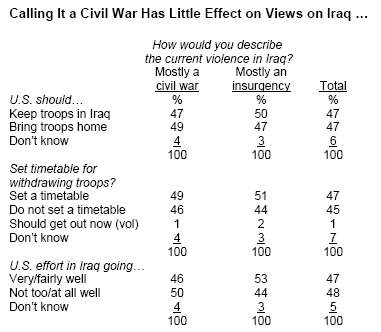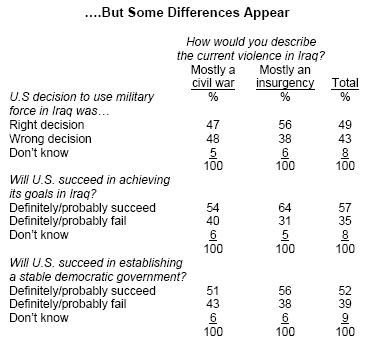by Scott Keeter
A mostly insiders-only debate about whether Iraq is in a state of civil war broke out into the open last week when two major news organizations announced that they would henceforth refer to the conflict as a civil war. According to polling in September by the Pew Research Center, much of the public had already reached that conclusion. By a 50%-to-37% margin, more Americans said the current violence in Iraq was mostly a civil war than said it was mostly an insurgency aimed at the United States and its allies.

Still — at least as recorded in the early fall of this year — believing that the conflict is a civil war does not automatically lead to opposition to the American role in Iraq. Analysis of the poll finds that both those who believe that a civil war is in progress and those who believe that the conflict is mostly an insurgency are evenly divided on the question of whether the U.S. should keep its troops in Iraq. (Among those who see a civil war, 47% opt for keeping troops in Iraq, compared with 50% among those who see mostly an insurgency.)
Similarly, belief that a civil war is underway is not correlated with the opinion that a timetable for troop withdrawals should be established (about half in each group favors a timetable). Nor are substantial differences seen between the two groups in judgments about how well the U.S. military effort in Iraq is going (50% of those who deem it a civil war say it is not going well compared with 44% of those who deem it primarily an insurgency), or about whether it has helped or hurt the war on terrorism (40% of the former group opt for “helped” vs. 46% of the latter group).
Some significant differences do emerge between the two groups. Those who believe that the conflict is a civil war are, for example, 10 percentage points more likely to say the United States made the wrong decision in using military force in the first place (48%, compared with 38% among those who think the war is an insurgency). And those who think the conflict is an insurgency are somewhat more optimistic that the United States will eventually achieve its goals in Iraq (64% say this) than those who think a civil war is underway (54%). Still, majorities of both groups express at least some optimism about the outcome.

And while Republicans and Democrats have very different views about many aspects of the war, they differ relatively little on the question of how the conflict can best be described. Just over half of Democrats (51%) say it’s mostly a civil war, while 47% of Republicans agree; 53% of independents describe it as a civil war.
From this one might conclude that — at least before the big debate over what to call it arose — something other than perceptions about the nature of the conflict in Iraq were driving public opinion about the decision to go to war and what to do now.



